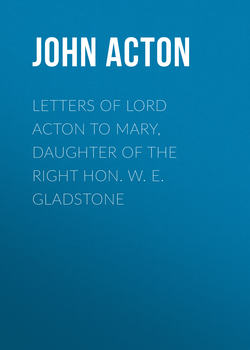Letters of Lord Acton to Mary, Daughter of the Right Hon. W. E. Gladstone

Реклама. ООО «ЛитРес», ИНН: 7719571260.
Оглавление
Acton John Emerich Edward Dalberg Acton Baron. Letters of Lord Acton to Mary, Daughter of the Right Hon. W. E. Gladstone
PREFACE
EDITOR'S PREFACE
INTRODUCTORY MEMOIR
LETTERS OF LORD ACTON
Отрывок из книги
In compiling the Introductory Memoir which follows I have been chiefly indebted to Dr. Shaw's excellent "Bibliography of Lord Acton," edited for the Royal Historical Society, and to a most interesting article in the Edinburgh Review for April 1903. I have also consulted Mr. Bryce's "Studies in Contemporary Biography," Sir Mountstuart Grant Duff's "Out of the Past," and an obituary notice in the Cambridge Review for October 1902, signed "F.W.M." Mr. Morley was good enough to lend me the copies of Lord Acton's letters to Mr. Gladstone which had been made for the purposes of his Biography. Neither the materials at my command nor the circumstances of the case justified me in attempting to write a Life of Lord Acton. I have merely sought to furnish such information as the readers of these letters would naturally desire to possess.
HERBERT PAUL.
.....
On the 15th of March 1870, a curious protest was presented to the Council by some bishops of the United Kingdom. The substance of it is thus described by Lord Acton: "They state that the English and Irish Catholics obtained their emancipation, and the full privileges of citizenship, by solemn and repeated declarations that their religion did not teach the dogma now proposed; that these declarations made by the bishops, and permitted by Rome, are, in fact, the conditions under which Catholics are allowed to sit in Parliament, and to hold offices of trust and responsibility under the Crown; and that they cannot be forgotten or overlooked by us without dishonour." Lord Acton complained bitterly of France because she maintained the temporal power of the Pope, and excluded Italians from their national capital, by her troops, while yet she would not attempt to restrain him from abusing the jurisdiction she enabled him to exercise. "The religious houses are suppressed, the schools of divinity reduced, the priesthood almost starved, because France is determined to keep the Pope on his despotic throne. It is a policy which degrades the Italian Government in the eyes of the nation, nurses the revolutionary passion, and hinders the independence of the country, and which can no longer be defended on the score of religious liberty. The French Protectorate has become as odious to Catholicism as to the Italian State, and it is about to prove as pernicious to other countries as it is to Italy." When a division was taken on the dogma of Infallibility, 451 bishops voted with the Pope, 88 against him, and 62 for further inquiry. Then the minority gave up the struggle, and when, on the 18th of July, three days after the declaration of war between France and Germany, the principle was formally defined, only two bishops resisted the acclamation of 533. A few weeks later the French troops left Rome, and the temporal power was at an end.
Such was the miserably futile result of the Opposition led by Darboy, Dupanloup, Rauscher, Schwartzenberg, Kenrick, Conolly, Hefele, and Strossmayer. They were borne down by the dead weight of numbers, and the traditional authority of the Holy See. Catholics were offered the choice of submission or excommunication. The official head of the English Catholics, Manning, was among the most zealous supporters of the Papacy. Newman deeply deplored, but humbly submitted. So even did Strossmayer, the brave and eloquent Croat, who had been shouted down at the Council in violent and abusive language when he denied that Protestantism was the source of Atheism, and pleaded for the old Catholic rule of unanimity. Döllinger, challenged by the Archbishop of Munich to accept the decree, refused, and was cut off, like Spinoza, to his eternal honour, from the congregation of the faithful. Lord Acton, on the other hand, the stay and support of the minority throughout the Council and before it, was not molested, perhaps because he was a layman, perhaps because he was a peer.
.....